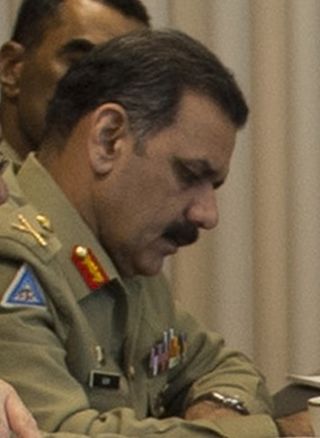
Transport in Pakistan is extensive and varied. In recent years, new national highways have been built, with the addition of motorways which have improved trade and logistics within the country. Pakistan's rail network is also undergoing expansion in recent years. Airports and seaports have been built with the addition of foreign and domestic funding. Transportation challenges in Pakistan are escalating due to poor planning, inadequate governance, and corrupt practices.

Gwadar is a port city on the southwestern coast of the Pakistani province of Balochistan. The city is located on the shores of the Arabian Sea, opposite Oman and has a population of over 90,000, according to the 2017 census. It was an overseas possession of Oman from 1783 to 1958. It is about 120 km (75 mi) southwest of Turbat. The sister port city of Chabahar in Iran's Sistan ve Baluchestan province is about 170 km (110 mi) to the west of Gwadar. On 2 April 2021, it was declared the winter capital of Balochistan.
The Gwadar Port is situated on the Arabian Sea at Gwadar in Balochistan province of Pakistan and is under the administrative control of the Maritime Secretary of Pakistan and operational control of the China Overseas Port Holding Company. The port features prominently in the China–Pakistan Economic Corridor (CPEC) and is considered to be a link between the Belt and Road Initiative and the Maritime Silk Road projects. It is about 120 kilometres (75 mi) southwest of Turbat, and 170 kilometres (110 mi) to the east of Chabahar Port.

The Conference on Interaction and Confidence-Building Measures in Asia (CICA) is an inter-governmental forum for enhancing cooperation towards promoting peace, security and stability in Asia. It is a forum based on the recognition that there is a close link between peace, security and stability in Asia and in the rest of the world. The key idea of the Conference is based on the priority of the indivisibility of security, joint initiative and mutually beneficial interaction of small and large states.

Mushahid Hussain Syed is a Pakistani politician, and journalist who is currently the Pakistan Senator from the Islamabad Capital Territory on the platform of the Pakistan Muslim League (N), since 3 March 2018.

Mithi is a city and the administrative capital of Tharparkar District in the Sindh province of Pakistan. It became the district headquarter of Tharparkar District in 1990, after the area's separation from Mirpur Khas. Mithi is one of the very few cities in Pakistan where Hindus form a majority. Close to 80% of Mithi's population belongs to the Hindu community. Both Hindus and Muslims reportedly live peacefully and there have been no reports of religious intolerance.

China–Pakistan relations, also referred to as Chinese-Pakistani relations or Sino–Pakistani relations, refers to the bilateral relations between the Islamic Republic of Pakistan and the People's Republic of China (PRC). Formal relations between China and Pakistan were established in 1950, when the Dominion of Pakistan was among the first countries to sever diplomatic relations with the Republic of China (ROC) government in favour of recognizing the PRC as the legitimate "China". Since then, relations between the two countries have been extremely cordial for more than half a century, which are influenced by their similar geopolitical interests. Both countries have placed considerable importance on the maintenance of a "special relationship" between them, and their regular exchanges of high-level visits have culminated in the establishment of various cooperative measures. China has provided economic, technical, and military assistance to Pakistan; both sides regard each other as close strategic allies.

Relations between Turkmenistan and Pakistan were established after Turkmenistan became independent from the Soviet Union.

The M-5 motorway, also known as Multan–Sukkur Motorway, is a north–south motorway in Pakistan, which connects Multan with Sukkur. The motorway is a 392 km long, high-speed, controlled-access, six-lane motorway that forms part of the China-Pakistan Economic Corridor. It is currently the longest motorway in Pakistan.

China–Pakistan Economic Corridor (CPEC) is a 3,000 km Chinese infrastructure network project in construction in Pakistan. This sea-and-land-based corridor is aimed to secure and reduce the passage for China's energy imports from the Middle East, by avoiding the existing route from the Straits of Malacca between Malaysia and Indonesia, which, in case of war could be blockaded, and thus hamper the Chinese energy-dependent economic avenues. Developing a deep water port at Gwadar in the Arabian Sea and a well built road and rail line from this port to Xinjiang region in western China would be a shortcut for boosting the trade between Europe and China. In Pakistan, it aims to overcome an electricity shortfall, infrastructural development and modernize transportation networks. Along with shifting it from an agricultural based economic structure to industrial based.

Lieutenant General Asim Saleem BajwaHI(M) TBt is a retired Pakistani three-star general who served as the chairman of China-Pakistan Economic Corridor Authority from November 2019 to August 2021 and the special assistant to then Prime Minister Imran Khan on the Ministry of Information and Broadcasting from 28 April 2020 to 12 October 2020. On 11 December 2016, Bajwa was appointed as Inspector General Arms at GHQ, where he served until his appointment to the position of Commander Southern Command and XII Corps in September 2017. Previously, he also served as Director General of the ISPR from 2012 to 2016.
SK Hydro also known as Suki Kinari HPP, is an under-construction, run-of-the-river hydropower project located on the Kunhar River at Balakot Tehsil in District Mansehra, Khyber Pakhtunkhwa, which has an installed generation capacity of 884 MW.

The M-14 Motorway, also known as the Islamabad–Dera Ismail Khan Motorway and the Hakla–Yarik Motorway, is a four-lane north–south motorway in Pakistan. The 285-kilometre-long (177 mi) motorway is a part of the Western Alignment of the China–Pakistan Economic Corridor, and offers high speed road connections between the Islamabad-Rawalpindi metropolitan area, and the southern parts of Khyber Pakhtunkhwa province around Dera Ismail Khan.

The Imran Khan government was the government of Pakistan which was formed by Imran Khan following his successful election as Prime Minister of Pakistan by the National Assembly. The cabinet had 25 federal ministers, 4 ministers of state and 4 advisors, most of whom assumed office on 20 August 2018.
The first 100 days of Imran Khan's prime ministership began with his swearing-in ceremony on 18 August 2018 as the 22nd Prime Minister of Pakistan – shortly after the oath-taking of the 15th National Assembly of Pakistan on 13 August, and the elected parliament's vote of confidence for Khan's premiership on 17 August. The 100th day of his prime ministership was 25 November 2018.

Haroon Sharif is a Pakistani economist who served as the Minister of State and Chairman Board of Investment under Prime Minister Imran Khan from September 2018 to June 2019.

The New Gwadar International Airport (NGIA) is under-construction airport in Gwadar, Pakistan. The airport is expected to be country's biggest when completed and be inaugurated by the Chinese leader Xi Jinping. Occupying 4,300 acres (17 km2) of land, it is located in Gurandani, 26 km north-east of the existing airport in Gwadar City on the south-western Arabian Sea coast of Balochistan region. NGIA is expected to cost $246 million. It is fully funded by China as a grant.
The Rashakai Special Economic Zone is a key initiative within the China-Pakistan Economic Corridor (CPEC) framework. Positioned in Rashakai, Nowshera, Khyber Pakhtunkhwa, it stands as one of the nine special economic zones planned for establishment between 2017 and 2030 as part of the CPEC initiative. Covering an area of around 1,000 acres, the zone's development is organized into three distinct phases.
The Quetta Mass Transit Train project is a proposed urban rail transit system for the city of Quetta, the provincial capital of Balochistan, Pakistan. The project aims to provide a modern, efficient, and sustainable mode of transportation to the residents of Quetta, addressing the growing need for public transport in the city.












